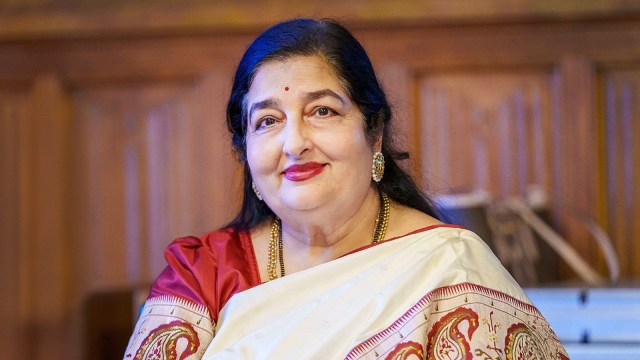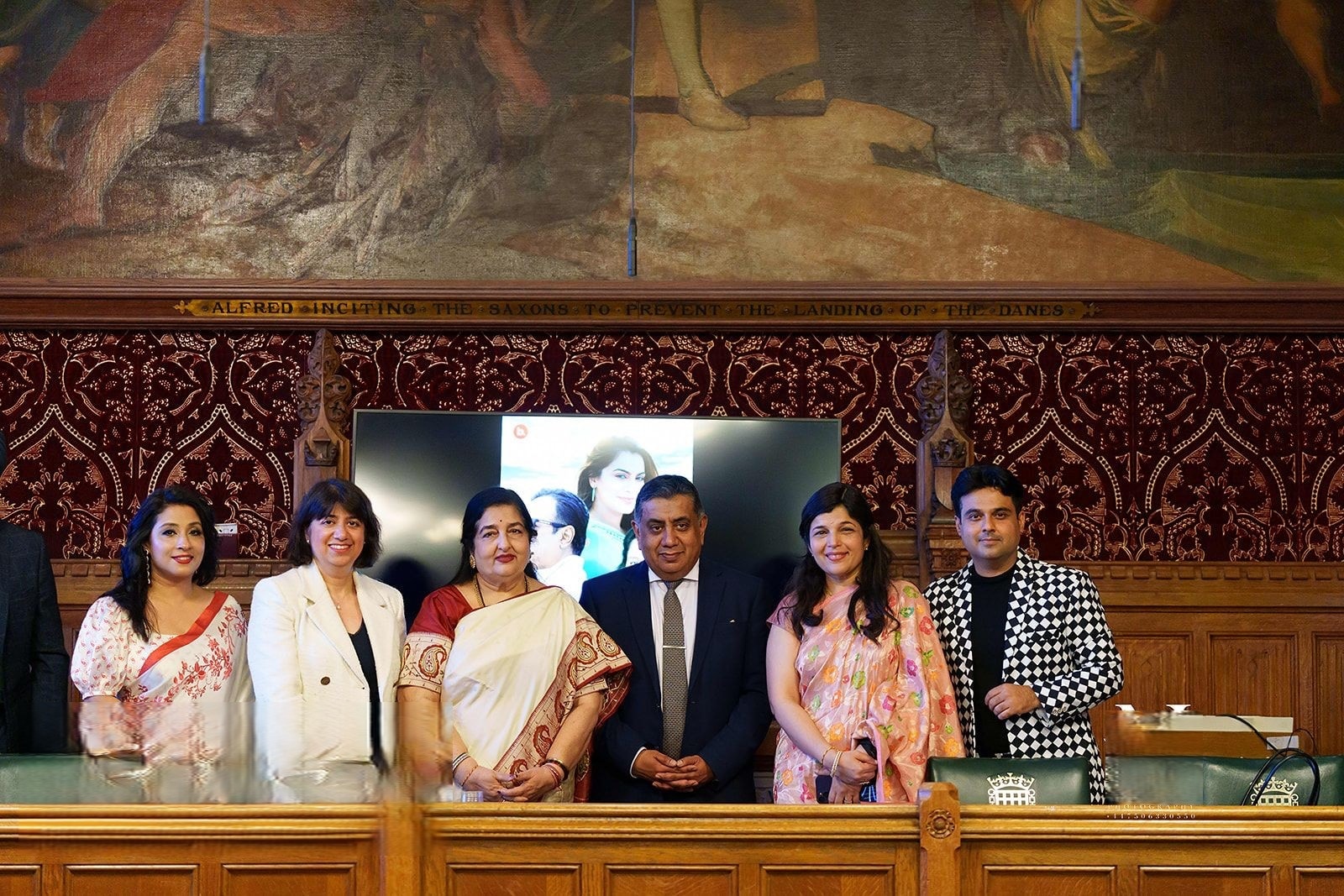📣 For more lifestyle news, click here to join our WhatsApp Channel and also follow us on Instagram
Anuradha Paudwal opens up about her early days: ‘My father was not very fond of music… film industry was not looked at as a respectable profession’
World Music Day: "Had I started in the digital age, I believe it would have been a different journey, but the core of my music—its spirituality and devotion—would have remained unchanged," Anuradha Paudwal said.
 Each song I've sung, whether in movies or devotional, has been a form of worship for me, Anuradha Paudwal said. (Photo: PR handout)
Each song I've sung, whether in movies or devotional, has been a form of worship for me, Anuradha Paudwal said. (Photo: PR handout)Anuradha Paudwal is no stranger to Hindi film music lovers. She began her career as a playback singer in the late 70s and became a household name in the 90s, delivering many hits. Her songs like Dhak Dhak Karne Laga, Dheere Dheere Se Meri Zindagi Mein Aana, Dil Hai Ki Manta Nahin, Chaha Hai Tujhko, Mujhe Neend Na Aaye and Nazar Ke Saamne, among others, are considered evergreen. Paudwal, with her devotional songs, continued her journey of being a hitmaker, selling record numbers of cassettes.
Behind her successful career lies a rocky start, and no formal music training. In an exclusive email interview with indianexpress.com, the Padma Shri awardee talks about her journey, her love for music, the use of AI in the music industry, the role social media plays in shaping careers today, and the song she considers her personal best. Read the edited excerpts below:
You have been an intrinsic part of India’s music scene, Bollywood and non-film songs; how would you describe your journey?
Anuradha Paudwal: My journey has been deeply fulfilling and spiritual. Each song I’ve sung, whether in movies or devotional, has been a form of worship for me. I believe music brings you closer to God.
Tell us about your early days; when and how did your love for music bloom?
Anuradha Paudwal: I have loved music since I was five years old. My father was not very fond of music but my mother always encouraged me. Since she travelled a lot for work, I grew up with my devout aunt, who would take me to Ramakrishna Mission. The seeds for spirituality were sown there.
Listening to Lata (Mangeshkar) ji’s vinyls, at a record store I worked at as a teenager, was my only training in music. Listening to the radio and Lata ji’s music instilled in me a deep sense of devotion and a profound love for music in me.
I got married very early to Arun ji, who was a well-known musician in the industry, and worked with Sachin Dev Burman. I sang a small shloka for Abhimaan as a playback for Jaya Bhaduri and the rest is history.
View this post on Instagram
You are still active in many ways. In what ways do you feel the industry has evolved over the years, and how would you rate these changes?
Anuradha Paudwal: The technological advancements, from analog recordings to digital production, have been remarkable. The digital age has brought about greater accessibility and reach.
However, the essence of music, its ability to touch the soul, should never be compromised. The spiritual connection that music fosters is timeless and should remain the focal point, irrespective of the era. Maintaining integrity should be the key for any musician.
I also find artificial intelligence (AI) making its way into the music industry fascinating. It is essential to approach this technology cautiously. Autotune and other AI-based tools should enhance the natural beauty of a singer’s voice, not replace the human element that gives music its soul. As we embrace these advancements, we must ensure that the spirit and spirituality of music are preserved.
Do you feel singers today have the added advantage of social media? How do you think your career would have panned out how you started out in the digital age?
Anuradha Paudwal: Social media offers a unique opportunity for artists to engage with their fans directly and showcase their talent. However, the success of a singer should not be judged solely by the number of followers they have. True success lies in the ability to touch hearts and create a lasting impact through music.
Had I started in the digital age, I believe it would have been a different journey, but the core of my music—its spirituality and devotion—would have remained unchanged. Digital tools would have simply been a means to share my message of love and peace more widely.
You recently presented the teachings of Shri Adi Shankaracharya at the House of Commons in the British Parliament. Tell us about his works, and how you have adopted them into your music.
Anuradha Paudwal: Adi Shankaracharya is a revered philosopher and teacher of Sanatan, who single-handedly strived to reintroduce a purist Vedic way of life. Integrating his timeless and profound teachings into my music has been a way to spread his message.
I am committed to taking his message of Sanatan Dharma––a universal philosophy that promotes individual strength, harmony and an inclusive ecosystem––to audiences around the world.
You are also known for your devotional music. Tell us about the tradition of Bhajan music from then to now, especially in the age of the Internet.
Anuradha Paudwal: Traditionally, bhajans were performed in temples and community gatherings, fostering a sense of collective spirituality. With the Internet, delivery mode has changed but essence remains the same. Digital platforms have allowed the timeless wisdom and divine vibrations encapsulated in these bhajans and mantras to reach a global audience.
 Anuradha Paudwal at the House of Commons in the British Parliament. (Photo: PR handout)
Anuradha Paudwal at the House of Commons in the British Parliament. (Photo: PR handout)
A song you consider your best, and why?
Anuradha Paudwal: It’s challenging to pick just one, but if I were to choose, I would say Om Jai Jagdish Hare holds a special place in my heart. Its timeless melody and profound lyrics resonate with spirituality and devotion.
Your views on the trend of remixes.
Anuradha Paudwal: While remixes bring a new dimension to classics, the original compositions should be respected. Music is an art form that should be cherished and preserved. Remixes should aim to enhance and celebrate the original work, rather than overshadowing its essence.
What does your daily routine entail now? How many hours of riyaaz do you still do?
Anuradha Paudwal: I start my day with meditation and prayers, followed by a few hours of riyaaz. I spend the rest of my time reading, engaging in charitable activities, and connecting with my family. Maintaining a balance between my spiritual practices and musical pursuits is essential for my wellbeing.
What can we expect from you this year?
Anuradha Paudwal: This year, my focus is on producing more devotional music that truly captures the spiritual essence of Sanatan Dharma. I plan to organise workshops and concerts globally that celebrate the richness of traditional Indian music. I will be adding extra efforts towards the conservation of nature, the upliftment of the underprivileged, and other activities.
I am also looking forward to collaborating with young artists to create a fusion of classical and contemporary styles, introducing a fresh wave of spiritual music for today’s audience. My mission is to continue spreading love, peace, and spiritual wisdom through my music.
📣 For more lifestyle news, click here to join our WhatsApp Channel and also follow us on Instagram



- 01
- 02
- 03
- 04
- 05

























